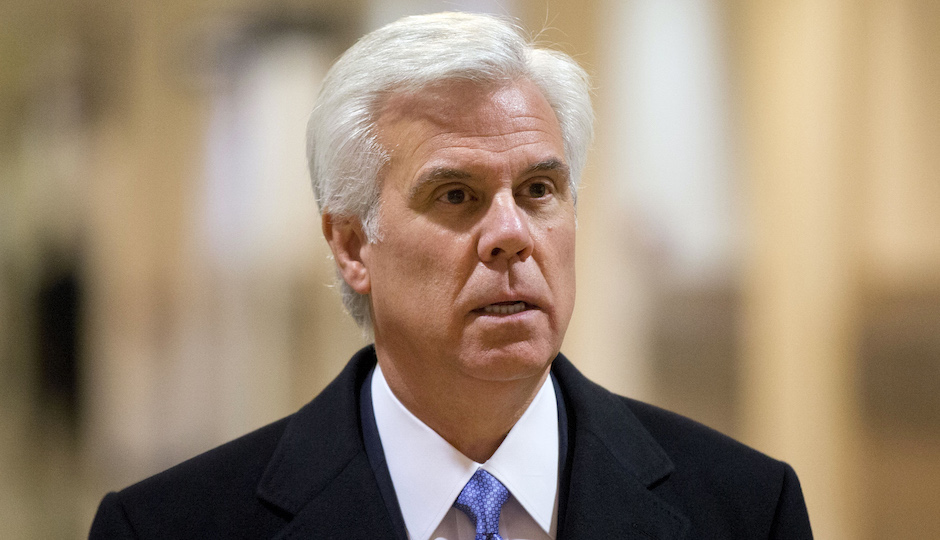The Brief: Is George Norcross Staking a Claim in Philly Politics?
1. George Norcross lands the first post-win meeting with Jim Kenney.
The gist: The Next Mayor has a juicy little scoop: George Norcross, the political kingmaker of South Jersey, was the first person to meet privately with Jim Kenney after he won the Democratic mayoral primary last week. Lauren Hitt, Kenney’s campaign spokesman, deemphasized their discussion. “Jim met with a lot of people [that] night and he invited them all back into the staff room because it was the only way to have a real conversation with anyone, given the crowd outside,” she said.
Why it matters: This is one of several clues that Norcross may be trying to stake a claim in Philadelphia politics. On Election Day, he stopped by the Famous 4th Street Deli, the legendary gathering place of Philly pols and power brokers. Two law firms connected to Norcross’ allies also contributed to The Turnout Project, a political committee that gave a key $725,000 donation to a pro-Kenney super PAC. Norcross is also behind the journalism startup phillyvoice.com, and formerly co-owned the Philadelphia Inquirer, Daily News and philly.com. If Norcross is indeed moving in on Philly politics, what would that mean for the city’s next mayor? Would he be a helpful partner or a major headache? We may soon find out.
2. The Philly Ethics Board kicks butt yet again.
The gist: In the final week before the primary election, a dark money group known as “Leadership Matters” started airing a TV ad bashing Jim Kenney. Typically, these organizations don’t file campaign finance reports, arguing that they don’t have to because they are registered as nonprofits. But the city’s Ethics Board maintains that they must if they spend money to influence an election. NewsWorks’ Dave Davies reports on how things went down between Leadership Matters and the Ethics Board:
When Leadership Matters emerged with its ad, the question was hanging: Would it comply with the board’s requirement and file a report of its late-campaign expenditure? It didn’t at first, but after I called the group’s executive director and noted that the group appeared to be in violation of the city’s campaign finance laws, he called the group’s lawyer and they filed the report, albeit a few days late.
That report didn’t reveal the group’s donors, just the size of its spending on the ad’s production and placement — $93,000.
But the fact that the group complied with the expenditure report requirement means that, unless they reverse filed and say they’re somehow exempt, they’ll file a post-election report disclosing their donors, along with the donors’ addresses, occupations and employers.
Why it matters: This is another example of a best practice coming out of the Philadelphia Board of Ethics. The board is particularly tough when it comes to super PACs and dark money. For instance, if a super PAC uses a candidate’s b-roll footage, a/k/a “McConnelling” videos, in a positive ad, the Ethics Board considers that coordination between the two organizations. As a result, any spending on such an ad would be subject to the city’s campaign contribution limits. And Philadelphia’s Ethics Board has now managed to strong-arm a dark money group into filing a campaign finance report, while mountains of undisclosed cash will likely be spent in the upcoming presidential campaign. Go Philly.
3. Memo to Jim Kenney: Pick your administration leaders now.
The gist: The Inquirer reports that former mayors Ed Rendell and W. Wilson Goode, Sr., as well as current Mayor Michael Nutter, have the same advice for Jim Kenney: Start selecting your top advisers now, before the general election is over. “He’s going to have to be strong, and I think he will be,” Rendell told the Inky. “If this administration is dotted with political appointees, it can’t be successful.”
Why it matters: Kenney has a choice: He can take a victory lap until the end of the year, or he can get to work immediately by putting together a team. He seems to be taking this responsibility seriously, saying,”I want to hit the ground running in January. I don’t want to be floundering around trying to find people. So there will be a robust transition process.” We’ll be keeping an eye out to see if Kenney keeps his promise. His selection of a chief of staff is particularly important. The significance of David L. Cohen, Rendell’s chief of staff in the 1990s, cannot be overstated. Rendell’s success as mayor was also partly attributed to the department heads he selected.
